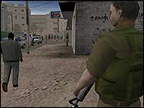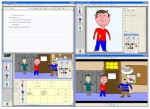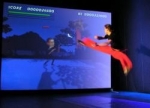Feb 17, 2007
New Video Games Aim at Improving Mental Health

Psychologist Mark Baldwin has developed and clinically tested a new commercial software, Mindhabits, that aims to decrease stress and build self-esteem:
MindHabits produces computer software designed to help people reduce their stress levels and boost their self-confidence, using games that automatically retrain the way the mind responds to social stress. This patent pending technology is the result of a decade of research by scientists at McGill University, one of the world's top medical research centers. The software -- based on the emerging science of social intelligence -- helps you practice the mind habit of focusing on positive social feedback, which in turn reduces stress levels and improves self-confidence...Our starting point is past research showing that insecurity feelings and daily stress arise, in large part, from anxieties about whether one will be liked, accepted, and respected by one's peers and significant others. Sometimes people are aware of these concerns, but often social insecurities of this type influence people's thoughts and feelings "automatically", without a lot of deliberate thought and sometimes even entirely outside of their awareness. All they experience are negative reactions to the self or to social situations.
People with fewer insecurities, on the other hand, seem to have a range of automatic thought processes that make them confident and buffer them from worrying about the possibility of social rejection. Fortunately, our recent research shows that with enough practice, even people prone to stress and low self-esteem can develop these beneficial thought processes that might allow them to gradually become more secure and self-confident. We started with the idea that just as playing the game Tetris over and over for hours can start to shape the way you look at the world (even in your dreams!), playing a specially-designed computer game might also help to improve your thoughts and feelings about yourself.
We drew on research showing that certain people have attentional biases toward socially threatening information, so they automatically focus on any sign of rejection or criticism from others, which in turn perpetuates their sensitivity to rejection and heightened tendency to experience social stress. The attentional training software teaches people to look for the smiling/approving person in a crowd of frowning faces. By doing this repeatedly and as quickly as possible, this trains an automatic response of looking for acceptance and ignoring rejection. In several studies we have shown that after using the software, people become less distracted by rejection, and they become less stressed at work and school.
20:55 Posted in Serious games | Permalink | Comments (0) | Tags: cybertherapy, serious gaming
GRAViTONUS® Gaming System For Quadriplegics
From Medgadget

Gravitonus, a new medical device company from Russia, has created Alternative Computer Control System (ACCS), a system designed to help paralyzed individuals control computers and 'resume active lifestyles'.
Any person with physical disabilities is entitled to active interaction with all aspects of social life, independent personal life, self-determination, freedom of choice, as are all other human beings.The concept of independent personal life assumes elimination of dependency from manifestations of an illness, removal of limitations generated by the illness, becoming functionally independent, formation of skills indispensable in day-to-day social engagements that should enable incorporation and problem free participation in all types of social activities, finally resulting in meaningful development as a valuable member of society.
People with paralyzed legs and hands (quadriplegics) can not execute any movement of arms and legs. At a high lesion of a spinal cord in cervical department of a vertebral column skeletal muscles cease to operate completely. Only the groups of mandibulo-facial muscles and tongue remain functional as they are innervated by cerebral nerves which are anatomically irrelevant to the spinal cord.
The proposed alternative hands-free computer control system ACCS - Alternative Computer Control System - is being already effectively used by SCI (spinal cord injury) patients who have become completely immobilized. If incorporated into personnal computer, home electronics and personnal movement control systems, ACCS will provide a person with an additional control contour, which will allow for continuous computer control.
ACCS GRAViTONUS® has high level of precision positioning, discontinuity, low response time, and is resistant to all kinds of noise interference.
ACCS is placed in a person's mouth (and comprises a tongue controlled directional command module along with 12 additional commands). It does not interfere with breathing, talk and consumption of fluids.
Without resorting to outside assistance, users can operate his or her movement accessory device, independently make telephone calls and respond to them. They can even be virtually present in any part of a house and actively participate in the life of their family, as well as use unlimited capabilities of the computer and INTERNET.
Completely motionless and otherwise helpless persons can compensate for lack of physical capabilities with their intellectual potential. ACCS GRAViTONUS® allows:
1. To realize many common professional skills, e.g., engage in scientific research, teaching, legal work, economic studies, engineering, medical, literary, musical and art activities, as well as countless other skills.
2. To gain new knowledge via remote education, on-line libraries, etc.
20:44 Posted in Serious games | Permalink | Comments (0) | Tags: serious gaming
Dec 03, 2006
Games for Health Competition
Re-blogged from Videogame workout
The Games for Health Competition runs from October 19 to April 1, 2007.
[there are] three specific competitions - two for storyboards & game treatments, and a grand prize for best working prototype/game. The following links provide basic information on each competition:
Student Storyboard & Treatment ($5,000 prize)
Organization Storyboard & Treatment ($5,000 prize)
Open Prototype/Health Game ($20,000 prize)
Five finalists will be announced in each competition with one finalist receiving the prize for that competition.
Official Rules are available here.
13:34 Posted in Serious games | Permalink | Comments (0) | Tags: serious gaming
A serious workout game




oh, that's brilliant!
For many people, exercise is simply boring, so they turn to devices that can help them keep their minds off what they’re doing while they exercise. Entertainment fitness uses technology to engage users rather than distract them.
Tetris Weightlifting is a prototype entertainment fitness system that allows players to lift weights as the means of control for a modified version of Tetris. User testing with the device suggests great potential for combining casual games with exercise activity.
Link to the Tetris Weightlifting website
13:25 Posted in Serious games | Permalink | Comments (0) | Tags: serious gaming
Nov 01, 2006
A game to help Swahili youths educate themselves about HIV prevention
via Medgadget

UNICEF has released a game to help Swahili youths educate themselves about HIV prevention and testing.
From the UN homepage:
Seeking to reach East African adolescents and young people in the battle against AIDS, the United Nations Children's Fund (UNICEF) has launched its first interactive feature in Swahili, an online game that empowers the young to make good life choices and prevent HIV.
The game, called 'Ungefanyaje' or 'What would you do?' in Swahili, takes the player through a series of relationship-based scenarios that emphasize the importance of HIV prevention and testing.
"Although prevention is essential to half the spread of HIV/AIDS, an alarming 80 per cent of all young people still don't know how to protect themselves from the virus," UNICEF said in a news release, noting that sub-Saharan Africa has been especially hard-hit by the epidemic.
"By speaking openly about the threat that HIV and AIDS poses to young people, we can help give them the knowledge they need to keep them safe from infection," said Amber Oliver, Coordinator of Voices of Youth, an Internet site created by UNICEF for the young who want to know more, do more and say more about the world.
"It is estimated that of the 2.3 million children under 15 living with HIV, 2 million are in sub-Saharan Africa. Reaching young people with prevention education and services is a crucial step towards an AIDS-free generation."
The game is available in English as well as Swahili
22:10 Posted in Serious games | Permalink | Comments (0) | Tags: serious gaming
Oct 26, 2006
Middle-East Conflict Informs Game

"Global Conflict: Palestine gives the option of three perspectives. A game based in the midst of the conflict in the Palestinian territories is set to be the latest release in the trend of politically-conscious gaming. Global Conflict: Palestine centres on the activities of a young journalist. The player must navigate between different Palestinian and Israeli sources to get to the truth of a story. "You can take a pro-Palestinian angle, a balanced angle, or a pro-Israeli angle," said Simon Egenfeldt-Nielsen, of Serious Games Interactive. Mr Egenfeldt-Nielsen told the BBC's Culture Shock programme: "The game is much more about the personal experience; the emotional experience."
The player walks around a city resembling Jerusalem and its surrounding areas talking to people. As the conflict intensifies, however, the situation becomes increasingly complex and exposes some of the reasons for the ongoing violence ... Different perspectives: Global Conflict: Palestine, which is released early next year, follows music channel MTV's internet-based Darfur Is Dying, which went online earlier this year and had 700,000 players in its first month. Later, tens of thousands of players sent e-mail messages to politicians to urge action over Darfur."
From Middle-East Conflict Informs Game, BBC News.
21:56 Posted in Serious games | Permalink | Comments (0) | Tags: serious gaming
Oct 16, 2006
Reuters opens virtual news bureau in 'Second Life'
Via Smart Mobs
New.com reports that Reuters is opening at a news bureau in the simulation game Second Life this week. Journalists will report financial and cultural stories within and about Second Life as part of the London-based company's strategy to reach new audiences with the latest digital technologies."Second Life" citizens can stay tuned to the latest headlines by using a feature called the Reuters News Center, a mobile device that users can carry inside the virtual environment. Stories will focus on both the fast-growing economy and culture of "Second Life" and also include links to Reuters news feeds from the outside world, ranging from Baghdad to Wall Street.
22:05 Posted in Serious games, Virtual worlds | Permalink | Comments (0) | Tags: virtual reality
Sep 30, 2006
Gaming Realities
|
|
What role do videogames play in our lives today? As the boundaries between the virtual and the real blur more and more in the new gaming worlds we have come to inhabit, new conditions arise.
With the theme Gaming Realities, medi@terra 06 aims to explore the different dimensions and developments in the gaming fields and the impact they have on the different fields of society today. This year's Festival and International Conference set up to explore the diverse ideas, narratives, and ideologies involved in the video games.
Videogames express and reflect today's world, its aesthetics and technologies, give rise to new identities and new mentalities. Medi@terra Festival has invited individuals who have realised the importance and dimensions which this field has acquired, asking them to deposit their viewpoints and experiences with regard to the connections of the game to society, the identity and psychology of the player, the space and narration of the game, new technologies and conceptions and possibilities for the computer game to comprise the key art of 21st century.
'Gaming Realities: the Challenge of Digital Culture' is a three days International Conference [6-8 October, Athens] organised by Fournos Centre for the Digital Culture.
19:43 Posted in Positive Technology events, Serious games | Permalink | Comments (0) | Tags: serious gaming
Sep 26, 2006
Gametrack: a new device for virtual rehabilitation?


15:00 Posted in Cybertherapy, Serious games, Virtual worlds | Permalink | Comments (0) | Tags: virtual reality, cybertherapy, serious gaming
Sep 17, 2006
How computer gamers experience the game situation
Delwin Clarke, P. Robert Duimering.
Computers in Entertainment (CIE), Volume 4 , Issue 3 (July 2006)
Very little is known about computer gamers' playing experience. Most social scientific research has treated gaming as an undifferentiated activity associated with various factors outside the gaming context. This article considers computer games as behavior settings worthy of social scientific investigation in their own right and contributes to a better understanding of computer gaming as a complex, context-dependent, goal-directed activity. The results of an exploratory interview-based study of computer gaming within the "first-person shooter" (FPS) game genre are reported. FPS gaming is a fast-paced form of goal-directed activity that takes place in complex, dynamic behavioral environments where players must quickly make sense of changes in their immediate situation and respond with appropriate actions. Gamers' perceptions and evaluations of various aspects of the FPS gaming situation are documented, including positive and negative aspects of game interfaces, map environments, weapons, computer-generated game characters (bots), multiplayer gaming on local area networks (LANs) or the internet, and single player gaming. The results provide insights into the structure of gamers' mental models of the FPS genre by identifying salient categories of their FPS gaming experience. It is proposed that aspects of FPS games most salient to gamers were those perceived to be most behaviorally relevant to goal attainment, and that the evaluation of various situational stimuli depended on the extent to which they were perceived either to support or to hinder goal attainment. Implications for the design of FPS games that players experience as challenging, interesting, and fun are discussed.
18:09 Posted in Serious games, Telepresence & virtual presence | Permalink | Comments (0) | Tags: presence, telepresence
Brain-training software
The latest BusinessWeek has an interesting report on brain training software. Although there is poor scientific evidence of the effectiveness of this approach in improving brain function, preliminary findings are encouraging:
This summer Posit released two studies [of their $395 Brain Fitness program] that Merzenich says prove its worth. One, involving 182 healthy people 60 and over, assigned half the group to Posit's brain exercises for eight weeks. The rest were asked only to watch educational DVDs. The researchers found that 93% of the Brain Fitness group significantly improved their memory function, while the control group did not.
In a second study released this summer, Posit's program was tried on 45 people diagnosed with MCI. PET scans of the brains of 15 participants were taken before and after the study. There was some evidence of memory gains in the Brain Fitness group, and the PET scans revealed a decline in brain activity in those who did not use the brain exercises. Brain activity held steady for the rest. "We've seen 80-year-old people improve from being sluggish and slow to having the mental performance level of a 35-year-old," says Merzenich.
17:53 Posted in Brain training & cognitive enhancement, Serious games | Permalink | Comments (0) | Tags: assisted cognition, serious games
Sep 16, 2006
Video game-based exercises for balance rehabilitation
Video game-based exercises for balance rehabilitation: a single-subject design.
Arch Phys Med Rehabil. 2006 Aug;87(8):1141-9
Authors: Betker AL, Szturm T, Moussavi ZK, Nett C
OBJECTIVES: To investigate whether coupling foot center of pressure (COP)-controlled video games to standing balance exercises will improve dynamic balance control and to determine whether the motivational and challenging aspects of the video games would increase a subject's desire to perform the exercises and complete the rehabilitation process. DESIGN: Case study, pre- and postexercise. SETTING: University hospital outpatient clinic. PARTICIPANTS: A young adult with excised cerebellar tumor, 1 middle-aged adult with single right cerebrovascular accident, and 1 middle-aged adult with traumatic brain injury. INTERVENTION: A COP-controlled, video game-based exercise system. MAIN OUTCOME MEASURES: The following were calculated during 12 different tasks: the number of falls, range of COP excursion, and COP path length. RESULTS: Postexercise, subjects exhibited a lower fall count, decreased COP excursion limits for some tasks, increased practice volume, and increased attention span during training. CONCLUSIONS: The COP-controlled video game-based exercise regime motivated subjects to increase their practice volume and attention span during training. This in turn improved subjects' dynamic balance control.
15:13 Posted in Cybertherapy, Serious games | Permalink | Comments (0) | Tags: serious gaming, cybertherapy
Aug 07, 2006
Social Impact Games
14:43 Posted in Serious games | Permalink | Comments (0) | Tags: serious gaming
Aug 02, 2006
The Huggable
Via Siggraph2006 Emerging Technology website

The Huggable is a robotic pet developed by MIT researchers for therapy applications in children's hospitals and nursing homes, where pets are not always available. The robotic teddy has full-body sensate skin and smooth, quiet voice coil actuators that is able to relate to people through touch. Further features include "temperature, electric field, and force sensors which it uses to sense the interactions that people have with it. This information is then processed for its affective content, such as, for example, whether the Huggable is being petted, tickled, or patted; the bear then responds appropriately".
The Huggable has been unveiled at the Siggraph2006 conference in Boston. From the conference website:
Enhanced Life
Over the past few years, the Robotic Life Group at the MIT Media Lab has been developing "sensitive skin" and novel actuator technologies in addition to our artificial-intelligence research. The Huggable combines these technologies in a portable robotic platform that is specifically designed to leave the lab and move to healthcare applications.
Goals
The ultimate goal of this project is to evaluate the Huggable's usefulness as a therapy for those who have limited or no access to companion-animal therapy. In collaboration with nurses, doctors, and staff, the technology will soon be applied in pilot studies at hospitals and nursing homes. By combining Huggable's data-collection capabilities with its sensing and behavior, it may be possible to determine early onset of a person's behavior change or detect the onset of depression. The Huggable may also improve day-to-day life for those who may spend many hours in a nursing home alone staring out a window, and, like companion-animal therapy, it could increase their interaction with other people in the facility.
Innovations
The core technical innovation is the "sensitive skin" technology, which consists of temperature, electric-field, and force sensors all over the surface of the robot. Unlike other robotic applications where the sense of touch is concerned with manipulation or obstacle avoidance, the sense of touch in the Huggable is used to determine the affective content of the tactile interaction. The Huggable's algorithms can distinguish petting, tickling, scratching, slapping, and poking, among other types of tactile interactions. By combining the sense of touch with other sensors, the Huggable detects where a person is in relation to itself and responds with relational touch behaviors such as nuzzling.
Most robotic companions use geared DC motors, which are noisy and easily damaged. The Huggable uses custom voice-coil actuators, which provide soft, quiet, and smooth motion. Most importantly, if the Huggable encounters a person when it tries to move, there is no risk of injury to the person.
Another core technical innovation is the Huggable' combination of 802.11g networking with a robotic companion. This allows the Huggable to be much more than a fun, interactive robot. It can send live video and data about the person's interactions to the nursing staff. In this mode, the Huggable functions as a team member working with the nursing home or hospital staff and the patient or resident to promote the Huggable owner's overall health.
Vision
As poorly staffed nursing homes and hospitals become larger and more overcrowded, new methods must be invented to improve the daily lives of patients or residents. The Huggable is one of these technological innovations. Its ability to gather information and share it with the nursing staff can detect problems and report emergencies. The information can also be stored for later analysis by, for example, researchers who are studying pet therapy.
12:05 Posted in AI & robotics, Emotional computing, Serious games | Permalink | Comments (0) | Tags: cybertherapy, robotics, artificial intelligence
Animation can be outlet for victimized children, a tool for research

Animation is a proven vehicle for biting comedy, a la "The Simpsons" and "South Park." But some of the same qualities that make it work for comedy make it valuable, too, as an outlet for victimized children and for a new research method that tests the empathy of teachers who may deal with them, says Sharon Tettegah, a professor of curriculum and instruction at the University of Illinois at Urbana-Champaign.
Tettegah believes so strongly in the value of animation – specifically “animated narrative vignette simulations” – that she sought out a computer science professor at Illinois, Brian Bailey, to help develop her concept for a child-friendly program for producing them.
The program that resulted, called Clover, gives children, as well as adults, a tool for making and sharing their own vignettes about their personal and sometimes painful stories.
According to Tettegah, the program is the only one she is aware of that allows the user to write the narrative, script the dialogue, storyboard the graphics and add voice and animation, all within one application. Those four major aspects of producing a vignette gave rise to the name “Clover,” the plant considered to bring good luck in its four-leaf form.
A paper about Clover, written by Bailey, Tettegah and graduate student Terry Bradley, has been published in the July issue of the journal Interacting With Computers.
In other research, Tettegah has used animations as a tool for gauging the empathy of teachers and others who might deal with children and their stories of victimization. One study with college education majors, or teachers-in-training, showed only one in 10 expressing a high degree of empathy for the victim, she said.
A paper about that study has been accepted by the journal Contemporary Educational Psychology (CEP), with publication slated for later this year. The co-author of the study is Carolyn Anderson, a professor of educational psychology at Illinois.
11:30 Posted in Cybertherapy, Serious games | Permalink | Comments (0) | Tags: serious gaming
Aug 01, 2006
Drinking Games
Via Medgadget
Miles Cox, professor of the psychology of addictive behaviors at the University of Wales, is experimenting a computer-based approach to get alcoholics to ignore the potent cues that trigger their craving. The study has been covered by MIT Technology Review:
Just as these responses can be conditioned, they can also be de-conditioned, reasons Cox. His computer program helps abusers deal with the sight of alcohol, since it's often the first cue they experience in daily life. The program presents a series of pictures, beginning with an alcohol bottle inside a thick, colored frame. As fast as they can, users must identify the color of the frame. As users get faster, the test gets harder: the frame around the bottles becomes thinner. Finally, an alcohol bottle appears next to a soda bottle, both inside colored frames. Users must identify the color of the circle around the soda. The tasks teach users to "ignore the alcohol bottle" in increasingly difficult situations, says Cox.Such tests have long been used to study attention phenomena in alcohol abusers, but they have never been used for therapy, says Cox. His group adapted the test for this new purpose by adding elements of traditional therapy. Before the tests, users set goals on how quickly they want to react; a counselor makes sure the goals are achievable. After each session, users see how well they did. The positive feedback boosts users' motivation and mood, Cox says.
Find more on the ESRC study page
17:20 Posted in Cybertherapy, Serious games | Permalink | Comments (0) | Tags: serious gaming, cybertherapy
Jul 29, 2006
Simulated violence experiment
According to this press release, psychologists at Iowa State have done the first study on violence desensitization from video games.
From the press release:
Ames, Iowa -- Research led by a pair of Iowa State University psychologists has proven for the first time that exposure to violent video games can desensitize individuals to real-life violence.
Nicholas Carnagey, an Iowa State psychology instructor and research assistant, and ISU Distinguished Professor of Psychology Craig Anderson collaborated on the study with Brad Bushman, a former Iowa State psychology professor now at the University of Michigan and Vrije Universiteit, Amsterdam.
They authored a paper titled "The Effects of Video Game Violence on Physiological Desensitization to Real-Life Violence," which was published in the current issue of the Journal of Experimental Social Psychology, a professional journal. In this paper, the authors define desensitization to violence as "a reduction in emotion-related physiological reactivity to real violence."
Their paper reports that past research -- including their own studies -- documents that exposure to violent video games increases aggressive thoughts, angry feelings, physiological arousal and aggressive behaviors, and decreases helpful behaviors. Previous studies also found that more than 85 percent of video games contain some violence, and approximately half of video games include serious violent actions.
Their latest study tested 257 college students (124 men and 133 women) individually. After taking baseline physiological measurements on heart rate and galvanic skin response -- and asking questions to control for their preference for violent video games and general aggression -- participants then played one of eight randomly assigned violent or non-violent video games for 20 minutes. The four violent video games were Carmageddon, Duke Nukem, Mortal Kombat or Future Cop; the non-violent games were Glider Pro, 3D Pinball, 3D Munch Man and Tetra Madness.
After playing a video game, a second set of five-minute heart rate and skin response measurements were taken. Participants were then asked to watch a 10-minute videotape of actual violent episodes taken from TV programs and commercially-released films in the following four contexts: courtroom outbursts, police confrontations, shootings and prison fights. Heart rate and skin response were monitored throughout the viewing.
When viewing real violence, participants who had played a violent video game experienced skin response measurements significantly lower than those who had played a non-violent video game. The participants in the violent video game group also had lower heart rates while viewing the real-life violence compared to the nonviolent video game group.
"The results demonstrate that playing violent video games, even for just 20 minutes, can cause people to become less physiologically aroused by real violence," said Carnagey. "Participants randomly assigned to play a violent video game had relatively lower heart rates and galvanic skin responses while watching footage of people being beaten, stabbed and shot than did those randomly assigned to play nonviolent video games.
See also a critique to this article by Ed Castronova, a "synthetic worlds" researcher.
21:05 Posted in Serious games | Permalink | Comments (0) | Tags: serious gaming
May 07, 2006
Videogame Duke Nukem used to investigate how sleep affects long-term memory

Results showed that sleep-deprived gamers recalled information from a different part of the brain to those who slept.
Writing in Proceedings of the National Academy of Sciences (PNAS), the team said its work also shed light on how we navigate in the real world.
See the full story
14:00 Posted in Serious games | Permalink | Comments (0) | Tags: Positive Technology
Kung-fu computer game delivers real kicks

New Scientist reports about a new Kung-fu computer game that allows the user to deliver real kicks:
Kick Ass Kung Fu lets players fight onscreen enemies using real kicks, punches, head-butts or by wielding any improvised weapon they choose. A video camera captures their movements from one side and superimposes a two-dimensional silhouette of them onto a computer screen. A computer then translates the silhouette's moves into real-time computerised kicks and punches, enabling a player to take on virtual opponents.
13:45 Posted in Serious games | Permalink | Comments (0) | Tags: Positive Technology
Apr 07, 2006
1st Annual Serious Games Showcase
11:05 Posted in Serious games | Permalink | Comments (0) | Tags: serious gaming








